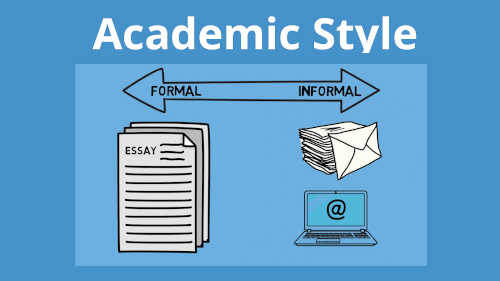Show AWL words on this page.
Show sorted lists of these words.


 







|
 Podcast is loading. Too slow? Click here to access.
Podcast is loading. Too slow? Click here to access.
This page gives information on academic writing style in English. It includes a list of 10 rules for academic style. The page also includes a style checklist for your writing, as well as some exercises to help you practice this area.
What is academic style in English?
Academic English, like any writing, has its own conventions or 'style'. It is a formal, written style, which means that it has aspects which make it different from 'spoken' academic English, and at the same time, being 'formal', it is quite different from ordinary writing which you might use in letters, emails, or stories.
This section considers 10 'rules' for good academic writing in English. Although rules are never a good idea for any form of study (because there are always exceptions), they are usually a good place to begin. These rules are concerned with the use of:
- formality (rules 1-5);
- objectivity (rule 6);
- precision (rules 7-8);
- tentative language (rule 9);
- explicit links (rule 10).
Rule 1
Use formal vocabulary, such as words from the academic wordlist (AWL), and words for numbers up to ten. Avoid less formal or idiomatic vocabulary.
✓ Many fathers nowadays...
✗ Many dads these days...
✓ Major urban centres, such as London and Beijing...
✗ Major urban centres, like London and Beijing...
✓ There are a significant number of people who believe...
✗ There are lots of people who believe...
✓ There are three main reasons for this.
✗ There are 3 main reasons for this.
Rule 2
Use formal verbs instead of two-word verbs.
✓ increase, decrease, discuss, improve, deteriorate, continue, raise
✗ go up,
go down, talk about, get better, get worse, go on, bring up
Rule 3
Use the full form of verbs, not contractions.
✓ do not, cannot, will not, did not
✗ don't, can't, won't, didn't
Rule 4
Use formal grammar structures, such as nominalisation (noun phrases) and clauses, rather than too many simple sentences.
✓ The increasing pollution of the environment is a global concern.
✗ The environment is increasingly polluted. This is a global concern.
✓ Note-taking, which is an important skill for EAP students, is difficult to master.
✗ Note-taking is an important skill for EAP students. It is difficult to master.
Rule 5
Use statements. Avoid rhetorical questions, which are less formal (though these are common in spoken academic English, i.e. lectures and presentations).
✓ There were four main reasons for the decline.
✗ What were the reasons for the decline?
✓ Written English is different from spoken English.
✗ How are written and spoken English different?
Rule 6
Use impersonal language, such as 'There is...', 'It is...', or passive voice. Avoid personal pronouns (I, we, you, etc.) and adverbs which show your feeling (e.g. luckily, remarkably, amazingly).
✓There are three main problems.
✗I can think of three main problems.
✓ In the experiment, the water was heated...
✗ In the experiment, I heated the water...
✓ There were very few errors in the experiment.
✗ Amazingly there were very few errors in the experiment.
Rule 7
Be as precise as possible. Use exact figures or values wherever possible, rather than 'about' or 'several'. Use words such as 'factor', 'issue', 'topic', 'aspect' instead of vague words such as 'thing'.
✓ There are three main reasons for this.
✗ There are several reasons for this.
✓ The turning point was in the late 1980s.
✗ The turning point was about 30 years ago.
✓ There were three factors which led to this result.
✗ There were three things which led to this result.
Rule 8
Be sure to cite your sources. Avoid making vague claims.
✓ Russell (2001) states that over 50% of the population are unaware of the problem.
✗ Everybody knows that most people are unaware of the problem.
✗ Most people are unaware of the problem.
Rule 9
Use hedging (i.e. tentative language), such as 'possibly', 'probably', 'may', 'might', 'appears to', and 'seems to' to qualify statements. Avoid absolute statements and words such as 'always'.
✓ Education may reduce crime.
✓ It appears that education reduces crime.
✗ Education reduces crime.
✓ This is possibly caused by the effects of global warming.
✓ This may be caused by the effects of global warming.
✗ This is caused by the effects of global warming.
✓ ESL students often make mistakes with tenses.
✗ ESL students always make mistakes with tenses.
Rule 10
Use appropriate transition signals to make explicit (i.e. clear) links between ideas and to introduce new sections of an essay. Avoid numbering or bullet points (except in certain reports), and basic transitions to begin sentences (e.g. 'And', 'But', 'So'). Also be careful not to use too many transitions (not at the beginning of every sentence!).
✓ Turning to the question of inflation...
✗ 2. Inflation.
✓ In addition, inflation is an important factor.
✗ And inflation is an important factor.
Checklist
Below is a checklist for academic style. Use it to check your own writing, or get a peer (another student) to help you.
| Item | OK? | Comment | |
| Formality | The writing uses formal vocabulary, not informal words | ||
| The writing uses formal verbs (e.g. increase), not two word verbs (e.g. go up) | |||
| The writing uses full form verbs (e.g. do not), not contractions (e.g. don't) | |||
| The writing uses formal grammar structures, such as nominalisation or clauses, not many simple sentences | |||
| The writing uses statements, not questions | |||
| Objectivity | The writing uses impersonal language, including passive where necessary, not personal pronouns (I, we, you, etc.) | ||
| Precision | The writing uses precise numbers or information, not imprecise words like 'about', 'several', or 'thing' | ||
| The writing cites the sources | |||
| Expressing uncertainty | The writing uses tentative language (e.g. 'may' or 'might') | ||
| Explicit links | The writing uses academic transition signals, not numbering or basic signals such as 'And', 'But', or 'So' |
Next section
Find out more about the writing process in the next section.
Previous section
Go back to the previous section which looks at what academic writing is.
Exercises & Activities Some ways to practise this area of EAP
You need to login to view the exercises. If you do not already have an account, you can register for free.







